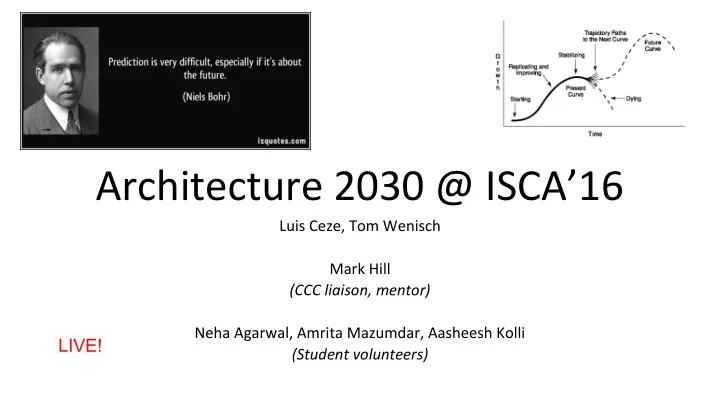

Architecture 2030 @ ISCA’16 Luis Ceze, Tom Wenisch Mark Hill (CCC liaison, mentor) Neha Agarwal, Amrita Mazumdar, Aasheesh Kolli LIVE! (Student volunteers)
Context • Many fantastic community formation/visioning workshops: • NSF ACAR, DARPA ISAT Future of Computer Systems without Technology Progress, IEEE Rebooting Computing, … • These efforts have significant impact on community and funding
Workshop goals • Kick-off a visioning exercise for Computer Architecture research for the next 15 years • Hear from Applications and Devices experts • Increase visibility of architecture to broader CS and funding agencies • Why now? A lot has changed in the last 5-10 years • Hardware design suddenly much more relevant but still (very) hard • Deep neural networks “caught us by surprise”, machine learning now a key workload • Major platforms emerged (cloud, IoT, etc) • Vertical integration (systems companies) • Explosion of sensor data (e.g., 1 trillion photos uploaded in 2015, genomics growing fast) • Open-source hardware emerging • Seed a community white-paper similar to the 21 st Century Architecture paper
Community input • Talked to several members of the community • Survey (~40 replies)
Big themes • Making HW as easy to design/write as SW, open sourcing • New devices/better exploitation of physics/biology • Post-ISA era • Post-Dennard/Post-Moore • Vertical integration (systems companies) • von Neuman is dead, long live von Neumann
Topic modeling analysis of our community’s work Vincent Lee, ISCA-1 to ISCA-42 MICRO-6 to MICRO-47 ASPLOS-1 to ASPLOS-20 UW-CSE (1974-2015) (1972-2015) (1982-2015) What’s in the corpus: (1) All 3700 papers published on ACM from ISCA, MICRO, and ASPLOS from 1972 to 2015 (2) No workshop papers
Publication Corpus By the Numbers Comments: (1) Number of publications in 1992 exceptionally high (2) ASPLOS occurring every other year could potentially increase strength of topics during the year it took place Vincent Lee, UW-CSE
Clear Topics that Manifest in the Model Quantum Computing DRAM Hardware Voltage Scaling Accelerators Fault Tolerance Graphics Cache Performance Network Architectures Database Encryption Microcoded Context Switching Architectures Machines Virtualization Systolic Array Compiler Neural Networks Architectures Optimizations Graph Processing Datacenter Replacement Network Interface Architectures Policies Architectures Branch Prediction Prefetching Die Stacked Memory Floating Point VLIW Log Based Microarchitecture Memory Debugging Management Cache Coherence Memory Scheduling Concurrency Bugs Consistency Energy Efficiency Synthesis and NVM and Persistent Vector Processing Verification Memory Vincent Lee, UW-CSE
Starting with Our Roots … Fundamental Microarchitecture Research Microcoded Machines and Programs We Cared About Much Simpler Things … Vincent Lee, UW-CSE
Things That Trended then Died Off … Support For Ancient Languages VLIW and Wide Issue Processors? RISC vs. CISC Instruction Set Wars Branch Prediction D. Pat’s RISC Position Paper (1980) Vincent Lee, UW-CSE
Trending Now Research Areas Hardware Security Approximate Computing Datacenter Architectures Accelerators Vincent Lee, UW-CSE
“Eternally Relevant” Research Making Sequential Things Faster Graphs Caches Vincent Lee, UW-CSE
8:30 Intro remarks by Luis Ceze and Tom Wenisch 8:50 Mark Hill (Wisconsin) on “21st Century Computer Architecture” Agenda 9:10 Tom Conte (GeorgiaTech) on “IEEE Rebooting Computing Initiative & International Roadmap of Devices and Systems” Devices Keynote: Philip Wong (Stanford) on “Device Technologies for the N3XT 1,000X Improvement in Computing 9:30 Performance” 10:30 Break 11:00 Steve Keckler (nVidia/UT Austin) on “The Influence of Academic Research on Industry R&D” 11:25 Michael Taylor (UCSD) on “Open Source HW: Architecture’s Only Hope for Survival” 11:45 Alvy Lebeck (Duke) on “Computing and Biomolecules” 12:05 Yuan Xie (UCSB) on “Technology-driven Architecture Innovation: Challenges and Opportunities” 12:30 Lunch Applications Keynote: Kayvon Fatahalian (CMU) on “100 Quadrillion Live Pixels: The Challenge of Continuously 14:00 Interpreting, Organizing, and Generating the World’s Visual Information” 15:00 Breakout session kick off 15:30 Coffee Break 16:00 Break-out session 17:00 Report-out/discussion 17:30 Wrap-up
Arch 2030 Break-out Session
Break-out session discussion topic • Articulate a grand-challenge/big-idea for the architecture community • Short description accessible to broader CS • What is the expected benefit if successful? • How will it push the field forward? • Which related disciplines will it draw from (PL, OS, ML, etc)? And how?
Example: DARPA grand challenges • Smart collaborative spectrum allocation (2016) • Self-driving car in urban settings (2007)
Logistics • Prep a 5-minute report-out • Please use the Google Slides template • https://goo.gl/ltWjWU • 5 groups (you should have a paper with a number) • Groups 1 in this room, 2, 3, 4 and 5 along the hallway rooms • Leaders: Report-out: 5pm • 1. Ras Bodik • 2. Joel Emer • 3. Sarita Adve • 4. Babak Falsafi • 5. David Wood
Break-out session questions • Articulate a grand-challenge for the architecture community • Short description accessible to broader CS • What is the expected benefit if successful? • How will it push the field forward? • Which related disciplines will it draw from (PL, OS, etc)? And how?
Heilmeier’s Catechism 1. What are you trying to do? Articulate your objectives using absolutely no jargon. 2. How is it done today, and what are the limits of current practice? 3. What's new in your approach and why do you think it will be successful? 4. Who cares? If you're successful, what difference will it make? 5. What are the risks and the payoffs? 6. How much will it cost? How long will it take? 7. What are the midterm and final assessments to check for success?
Recommend
More recommend